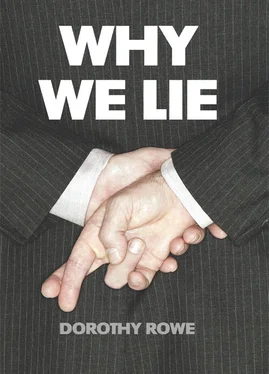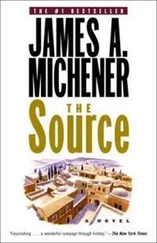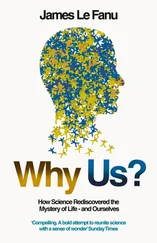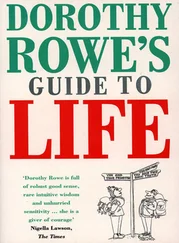We search for truth, both shared and individual truths, in many different ways. All of our arts are concerned with the exploration of shared and individual truths. If we lack the ability to create art, we can explore shared and individual truths in the living of our life, conforming to society’s expectations when it suits us to do so and at other times exploring the possibilities of our individual truths by creating alternative interpretations of our experiences. When we act on our alternative interpretations, we create different outcomes. However, there are many people who refuse to acknowledge the extraordinary and marvellous uncertainty of existence. They turn away from the wonder of being alive and construct instead something that is mundane, repetitive and deadening. Those people who are frightened by uncertainty and try to deal with their fear do this by controlling others, be they individuals like my mother or organizations like the State and the Church.
Whatever the form of government, the State has always used repression and social sanctions to produce conformity in its subjects. The recognition of individual truths has always been very limited, even in those places where people pride themselves on freedom of speech. The religions of the book, Judaism, Christianity and Islam, have always used their sacred texts as the means of enforcing conformity of thought and deed among their followers. Within each of these religions, individuals who came to believe that their individual truths were truer than the shared truths of that particular religion formed break-away groups, where the original individual truths then become shared truths which must be believed by all the members of that group. In the twentieth century, increased military efficiency and the invention of cameras, radio, film and television made possible the creation of large totalitarian states – the USSR, Communist China, North Korea – where all citizens were required to give up who they were and become what the State wanted them to be. Increasingly, computers are being used to bring together all the technologies of indoctrination and surveillance in order to ensure that all citizens live the terrible lie of denying their own individual truths. Naomi Klein, describing the vast social experiment that is taking place in the city of Shenzhen, China’s first ‘special economic zone’, told how, ‘Over the past two years, some 200,000 surveillance cameras have been installed throughout the city… The closed-circuit TV cameras will soon be connected to a single, nationwide network, an all-seeing system that will be capable of tracking and identifying anyone who comes within its range.’ The aim is to install about two million CCTVs in Shenzhen. This is just part of a much bigger programme called ‘Golden Shield’. Meanwhile, in countries that pride themselves on their freedom both government agencies and private businesses install surveillance cameras. In 1949 George Orwell saw all this and worse in his novel of what was then the future, 1984 . Orwell saw how easily we could lose our freedom and not realize that it had gone. 1
Many people will say that surveillance is not a problem for law-abiding people. In saying this, they are assuming that the laws are just and wise because the people who make the laws are just and wise, and know what is best for their people. Heaven forfend that political leaders would ever lie to their people!
People who hold these views want certainty and security. They do not want to be told that there is nothing about which we can be absolutely certain, or that security and freedom always come in inverse proportion, but it can be difficult to predict just what these proportions will prove to be. Many a woman has married in the belief that her husband will give her the security she needs, only to find that he gives her the security of a prison. Most dictators come to power on a wave of popular acclaim, but the populace soon discover that their cheers have turned to tears.
I did not come upon an understanding of how we exist and make sense of our existence in one extraordinary revelation. Rather I stumbled towards it. By great good fortune, when I became a clinical psychologist, I was able to spend virtually unlimited time talking with troubled people about their experience of living. We talked in ordinary, everyday language about ordinary, everyday things, and about the kinds of painful, disturbing experiences which throw into doubt everything that we believed was true. Abstract concepts like traits, or personality types, or mental illnesses could not account for my clients’ experiences. But, if we looked at these experiences in terms of how each person interpreted the events in their lives, everything became clear. What determines our behaviour is not what happens to us but how we interpret what happens to us.
My fellow psychologists did not regard what I did as proper psychology. Asking people how they saw themselves and their world was ‘subjective’ and ‘anecdotal’. Apart from a few neuropsychologists, most of my colleagues were oblivious of the extraordinary progress there had been in the understanding of how the brain functioned. It was now clear that the traditional division of brain and mind was not just erroneous but a great impediment to our understanding of ourselves. However, in ignoring all this, these psychologists were no different from other people.
The last twenty years has seen some huge advances in science. Scientists have not kept this knowledge to themselves. Many of them have written excellent books in which they not only explain their science to non-scientists but they do so in a way which excites their readers’ continuing curiosity. When the science can be combined with wonderful pictures, a good script and an interesting presenter, we watch in our millions. However, when the science concerns the natural world, or geology, or geography, or astronomy what we are being told is out there, separate from us. Being told about climate change is somewhat worrying, but then we can delude ourselves it won’t happen in our lifetime. But, when it comes to how our brains function or how we perceive, we cannot separate ourselves from the science. This is difficult enough when we are watching a television programme about cancer or about a nasty operation being performed, but how do we deal with what Chris Frith, Emeritus Professor of Neuropsychology at University College London, is telling us when he writes, ‘Even if all our senses are intact and our brain is functioning normally, we do not have direct access to the physical world. It may feel as if we have direct access, but this is an illusion created by our brain’? 2
Computers have been around long enough for us not to be disturbed by the idea that the brain is a kind of computer. Twenty-odd years ago neuroscientists took this metaphor seriously. Now they know that the brain is not like a computer. Unfortunately, some aspects of the brain as a computer metaphor have proved to be very popular. If you have a bad temper, it is not your fault because you were programmed early in life to be bad tempered. Those of us who have no religious beliefs are likely to be told by godly people that religious belief is ‘hard-wired’ into every brain, including ours. It is difficult to give up a self-serving metaphor, especially when the new metaphor, which is closer to the truth, is difficult to comprehend.
The neuroscientist Marco Iacoboni pointed out that, just as the casing of a computer is simply a container for the memory and the software of the computer, so, in the computer metaphor, ‘mental operations are largely detached from the workings of the body, with the body a mere output device for commands generated by the manipulation of abstract symbols in the mind’. However, it is now clear that ‘our mental processes are shaped by our bodies and by the types of perceptual and motor experiences that are the product of their movement through and interacting with the surrounding world’. 3Our mind is shaped by the way our body interacts with the world around us. Thus our brain contains maps of, say, our hand curving around a cup and of our body balancing itself as we walk over rough ground.
Читать дальше












